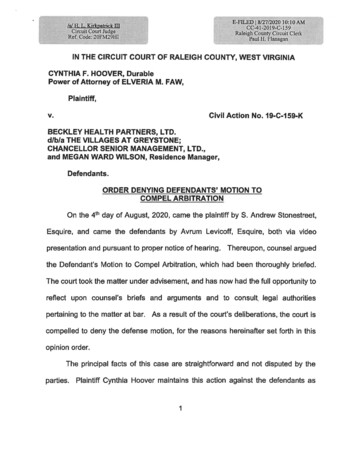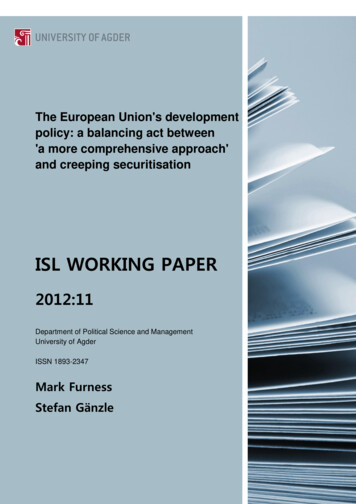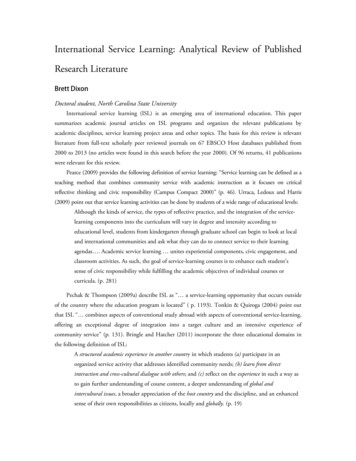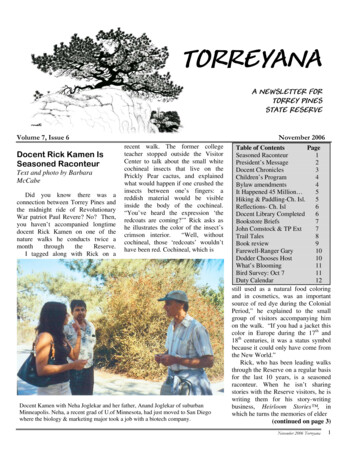
Transcription
E-FILED l 8/27/202010:10AMCC-41-2019-C-159Raleigh County Circuit ClerkPaul H. FlanaganIsl H, L. Kirkpatrick WCircuit Court JudgeRef. Code: 20FM29HIIN THE CIRCUIT COURT OF RALEIGH COUNTY, WEST VIRGINIACYNTHIA F. HOOVER, DurablePower of Attorney of ELVERIA M. FAW,Plaintiff,Civil Action No. 19-C-159-KY.BECKLEY HEALTH PARTNERS, LTD.d/b/a THE VILLAGES AT GREYSTONE;CHANCELLOR SENIOR MANAGEMENT, LTD.,and MEGAN WARD WILSON, Residence Manager,Defendants.ORDER DENYING DEFENDANTS' MOTION TOCOMPEL.ARBITRATIONOn the 4th day of August, 2020, came the plaintiff by S. Andrew Stonestreet,Esquire, and came the defendants by Avrum Levicoff, Esquire, both via videopresentation and pursuant to proper notice of hearing. Thereupon, counsel arguedthe Defendant's Motion to Compel Arbitration, which had been thoroughly briefed.The court took the matter under advisement, and has now had the full opportunity toreflect upon counsel's briefs and arguments and to consult. legal authoritiespertaining to the matter at bar. As a result of the court's deliberations, the court iscompelled to deny the defense motion, for the reasons hereinafter set forth in thisopinion order.The principal facts of this case are straightforward and not disputed by theparties.Plaintiff Cynthia Hoover maintains this action against the defendants as1
Administratrix of the estate of her mother, Elveria May Faw, deceased. 1 In hercomplaint, plaintiff asserts against these defendants statutory and common lawclaims based on alleged inadequacy of services provided to the decedent while shewas a resident at an assisted living residence known as "The Villages at Greystone"(hereinafter "Greystone"), located in Daniels, Raleigh County, West Virginia.Elveria May Faw became a resident of Greystone on or about September 3,2017.Prior thereto, on August 30, 2017, Cynthia Hoover executed an AssistedLiving Residency Agreement (hereinafter, "Residency Agreement") on behalf of hermother.During the period of time that Ms. Faw resided at Greystone, she wasprovided with care and services under the terms of the Residency Agreement. Aspart of the paperwork presented to her, Ms. Hoover also executed a "CommunityArbitration Agreement" (hereinafter, "Arbitration Agreement") on behalf of hermother, which requires arbitration of "any legal dispute, controversy demand orclaim . that arises out of or relates to the [Residency Agreement]".2The ArbitrationAgreement also requires arbitration of "any claims for . violations of any right granted1 Plaintiff Cynthia Hoover instituted this lawsuit as power of attorney of Elveria MayFaw; however, subsequent thereto, Ms. Faw departed this life and Ms. Hooverqualified as administratrix of her estate. A Suggestion of Death filed herewith onOctober 16, 2019, indicates that the death of Ms. Faw occurred on October 5, 2019.An Order Amending Case Caption to reflect the death of Ms. Faw was entered hereinon November 15, 2019.2 Defendants assert that Ms. Hoover represented to the licensed owner andoperator of Greystone that she was authorized to act on behalf of her mother insigning both the Residency Agreement and the Arbitration Agreement.2
to Resident by law . .for breach of contract, fraud, misrepresentation, negligence, . orany other claim based upon any departure from accepted standards of medical orhealth care or safety . " Lastly, the Arbitration Agreement contains an "opt-out"provision which states that "the execution of this Arbitration Agreement is not aprecondition to the furnishing of services to the Resident. . " and that "this ArbitrationAgreement may be rescinded by written notice to [Greystone] from the Residentwithin 30 days of signature."At the time of the execution of the Residency Agreement and ArbitrationAgreement on August 30, 2017, Ms. Hoover had not been appointed power ofattorney to act in the stead of Ms. Faw; however, she had been appointed her healthcare surrogate. Thereafter, Ms. Faw appointed Ms. Hoover as her General DurablePower of Attorney on September 8, 2017 -nine (9) days after execution of theArbitration Agreement.At issue before the court is the enforceability of the Arbitration Agreement.The United States Supreme Court has explained that "arbitration is simply amatter of contract between the parties; it is a way to resolve disputes - but only thosedisputes - that the parties have agreed to submit to arbitration." First Options of.Chicagoi Inc. , v. Kaplan, 514 U.S. 938, 943, 115 S.Ct. 1920, 131 L.Ed.2d 985 (1995).Because it is well settled that arbitration is a matter of contract, as a general rule, onlysignatories to an arbitration agreement will be required to submit to arbitration. It isa central rule of contract law that "[a] party generally cannot be forced to participate in3
an arbitration proceeding unless the party has, in some way, agreed to participate."Chesapeake Appalachia , L.L.C. v. Hickman, 236 W.Va. 421, 439, 781 S.E.2d 198,216 (2015).However, "[w]ell-established common law principles dictate that in anappropriate case a nonsignatory can enforce, or be bound by, an arbitration provisionwithin a contract executed by other parties."lnt'I Paper Co. v. SchwabedissenMaschinen & Anlagen GMBH, 206 F.3d 411, 416-17 (4th Cir. 2000). Our SupremeCourt has recognized several common law principles in which a signatory to anarbitration agreement can, in very limited circumstances, require a nonsignatory tocomply with the agreement. A signatory to an arbitration agreement cannot requirea non-signatory to arbitrate unless the non-signatory is bound under some traditionaltheory of contract and agency law.The five traditional theories under which asignatory to an arbitration agreement may bind a non-signatory are: (1) incorporationby reference; (2) assumption; (3) agency; (4) veil-piercing / alter ego; and (5)estoppal.Syllabus Point 10, Chesap:eake Appalachia , L.L.C. v. Hickman, 236W.Va. 421, 439, 781 S.E.2d 198, 216 (2015).However, the Supreme Court hasadmonished trial courts asked to apply these theories to "be wary of imposing acontractual obligation to arbitrate on a non-contracting party." Id. at 440, 781 S.E.2dat 217;Defendants rely upon these four theories to enforce the arbitration agreementagainst the non-signatory decedent: ( 1) the plaintiff herself signed the arbitration4
agreement, (2) estoppel, (3) the doctrine of unilateral contract, and (4) ratification.Plaintiff counters by asserting that the agreement to arbitrate between the parties issimply invalid under law, and relies singularly upon State ex rel. AMFM , LLC v. King,230 W.Va. 471, 740 S.E.2d 66 (2013), a case with similar facts to the instant one.Although the plaintiff, Cynthia F. Hoover did in fact sign the ArbitrationAgreement and is named as a party to this civil action, it is clear that she is pursuingthis lawsuit, not in her own right, but as Administratrix of the Estate of the decedent,Elveria May Faw.Furthermore, it is clear that when she signed the ArbitrationAgreement, she did so, not on her own behalf, but under purported authority onbehalf of her mother, Ms. Faw. To be valid, the subject Arbitration Agreement musthave (1) competent parties; (2) legal subject matter; (3) valuable consideration; and(4) mutual assent. Absent any one of these elements, the Arbitration Agreement isinvalid. Syllabus Point 3, in part, DanRyan Builders, Inc. v. Nelson, 230 W.Va. 281,737 S.E.2d 550 (2012). The first criterion that must be satisfied to enforce thesubject Arbitration Agreement is "competent parties." To be a competent party, theperson signing an arbitration agreement must have had the authority to do so.Here, because the power of attorney had not been executed by Ms. Faw at the timethe Arbitration Agreement was signed, Ms. Hoover was not a "competent party" to actin her mother's stead.At first blush, estoppal appears to be the defendants' strongest argument andis somewhat persuasive as a traditional theory to apply to bind a non-signatory.5
Defendants argue that plaintiff is estopped from avoiding the Arbitration Agreementsigned on behalf of her mother, based on her representations of authority.Furthermore, the defense points out that Ms. Faw received and accepted all thebenefits and services under the Residency Agreement and now cannot avoid theimplementation of the associated Arbitration Agreement.However, a close analysis of these circumstances will demonstrate decidedlythat reliance upon the concept of estoppal is misplaced. It must first be observedthat the Arbitration Agreement is not a clause or provision contained within theResidency Agreement.Both contracts are separate, stand-alone instruments.The services provided by Greystone to the Resident are fully outlined in theResidency Agreement. Those services were provided to Ms. Faw because she orher daughter paid good money for them.The separate and distinct ArbitrationAgreement expressly states that its execution is not a precondition to the furnishingof services to the Resident by [Greystone]. 3 The Arbitration Agreement also setforth a means by which the Resident could rescind the agreement within 30 days ofsignature. Clearly then, Greystone would have provided health care services to Ms.Faw whether or not the Arbitration Agreement was in place; thus, the matter ofarbitration was in no way part of the bargain.3 To be fair, to state otherwise and provide that the Arbitration Agreement was, infact, a precondition to the furnishing of services, would be strictly violative of law asbeing unconscionable.6
Furthermore, it is well established that estoppel "prevents a non-signatory from'cherry-picking' the provisions of a contract that it will benefit from and ignoring otherprovisions that don't benefit it or that it would prefer not to be governed by (such asan arbitration clause)."Bayles v. Evans, 842 S.E. 2d 235, 244 (2020), quotinglnvista S.A.R.L. v. Rhodia , S.A., 625 F.3d 75, 85 (3 rd Cir. 2010). Stated simply, anonsignatory who seeks to reap the benefits of a contract must bear its burdens aswell. But this is not a circumstance here where the plaintiff has embraced parts ofeither of the subject contracts, but turned her back on those portions that thenonsignatory finds distasteful.Lastly, the court is mindful of the premise that anonsignatory is estopped from refusing to comply with an arbitration clause "when itreceives a 'direct benefit' from a contract containing an arbitration clause." Bayles,supra., 245, quoting International Paper Co., 206 F.3d at 418."Direct-benefitestoppel involve(s] non-signatories who, during the life of the contract, haveembraced the contract despite their non-signatory status but then, during litigation,attempt to repudiate the arbitration clause in the contract." Hellenic Inv. Fund, Inc.v. Det Norski Veritas, 464 F3d 514, 517. There is no indication that the plaintiff onbehalf of the non-signatory has improperly obtained a direct benefit here from eitherof the contracts at issue and is now attempting to exploit that contract or a portionthereof."The doctrine of estoppel should be applied cautiously and only when equityclearly requires it to be done." Syllabus Point 3, Humble Oil & Ref. Co. v. Lane, 1527
W.Va. 578, 165 S.E.2d 379 (1969); Samsel! v. State Line Dev. Co., 154 W.Va. 48174 S.E.2d 318 (1970). This court concludes that upon a circumspect application ofthe doctrine of estoppel, such concept is not warranted under the facts presented inthe instant case.Defendants further rely upon the proposition of unilateral contract, and invokethe holding of the West Virginia Supreme Court of Appeals in CitizensTelecommunications Company of West Virginia v. Sheridan, 239 W.Va. 67, 799S.E.2d 144 (2017).In that case, customers of an internet service provider instituteda putative class action against the provider, alleging that the service was muchslower than advertised, and sought declaratory relief that the action was not subjectto arbitration.The provider moved for arbitration.The Court observed that aunilateral contract is established "where one party makes a promissory offer and theother accepts by performing an act rather than by making a return promise."Citizens Telecommunications, supra., 150, 73, quoting Cook v. Heck's Inc., 176W.Va. 368, 373, 342 S.E.2d 453, 458 (1986).Furthermore, "an acceptance may beeffected by silence accompanied by an act of the offeree which constitutes aperformance of that requested by the offeror." First Nat'I Bank v. Marietta Mfg. Co.,151 W.Va. 636, 641-42, 153 S.E.2d 172, 176 (1967).The Court held that theprovider presented its Terms and Conditions as a condition of providing Internetservice to customers, and the provider's customers accepted those Terms andConditions by using and paying for that Internet service, forming a unilateral contract.8
However, the facts at bar may be distinguished from the CitizensTelecommunications case.The latter did not expressly address circumstancesrelated to a non-signatory party; instead, the case focused upon whether or not theinternet service provider's customers assented to an arbitration clause contained inchanges to the provider's terms and conditions of service after the customers hadsigned up. At the time the subscribers signed up for internet service, the terms andconditions of service contained a provision that permitted the provider to proposechanges to such terms, upon notice to customers. This pertinent language wasincluded: "You accept the changes, if you use the service after notice isprovided." Thereupon, the provider altered the terms and conditions by adding abinding arbitration provision.In the present case, there is no dispute over altered terms, and there is nolanguage in the subject Arbitration Agreement pertaining to the deemed acceptanceof additional conditions under certain circumstances. As heretofore discussed, ourArbitration Agreement is not a part of a multi-clause contract between parties whoboth made certain promises regarding arbitration and other substantive rights.Instead, such Agreement is a separate instrument that stands on its own two hindlegs, and is independent of promissory offers and health care duties provided byGraystone as outlined in the Residency Agreement or elsewhere.Finally, defendants cite as their fourth validation device the concept ofratification. The defense points out that when Ms. Hoover signed the agreements in9
question, she had been appointed as Ms. Faw's medical surrogate per West VirginiaCode§ 16-30-1, et seq. 4 As such, Ms. Hoover had direct authority to make healthcare decisions on behalf of her mother.Defendants argue further that Ms. Hooveralso had the expanded authority to act on behalf of her mother in all affairs, pointingout that she never disavowed signing either the Residency Agreement or theArbitration Agreement. As the argument goes, although Ms. Hoover may not havehad the legal authority to sign the agreement at the time of execution, she thenobtained such authority by power of attorney nine (9) days afterwards.The aforegoing argument may be dispatched upon application of the principlesof State ex rel. AMFM , LLC v. King, 230 W.Va. 471, 740 S.E.2d 66 (2013), which isremarkably similar to the case at bar in terms of the underlying factual scenarios.InAMFM, the decedent's daughter had been appointed as healthcare surrogate for hermother, who was admitted as a resident in a nursing home.Upon admission, thedaughter signed a "Resident and Facility Arbitration Agreement", which required thatany legal dispute or claim arising out of health care provided by the nursing homeshall be resolved exclusively by binding arbitration.The Arbitration Agreementindicated that acquiescence thereto was not a precondition of the resident'sadmission to the nursing home or the receipt of services therefrom and that she could4 Pursuant to West Virginia Code § 16-30-8, a "surrogate is authorized to makehealth care decisions on behalf of the incapacitated person ."10
rescind the Arbitration Agreement within thirty days of its signing.Subsequentlythereto, the daughter was appointed to serve as her mother's power of attorney.In writing for the Court, Justice Davis observed that the decedent's daughter'srole as health care surrogate permitted her to make only health care decisions andwas not a "competent party" to the Arbitration Agreement because she did not havethe authority to sign the subject document on her mother's behalf."An agreement tosubmit future disputes to arbitration, which is optional and not required for the receiptof nursing home services, is not a health care decision under the West VirginiaHealth Care Decisions Act, W Va. Code § 16-30-1. et seq."Pursuant to WestVirginia Code § 16-30-8, a "surrogate is authorized to make health care decisions onbehalf of the incapacitated person . " Syllabus Point 8, AMFM, supra.''The fundamentals of a legal contract are competent parties, legal subjectmatter, valuable consideration and mutual assent. There can be no contract if thereis one of these essential elements upon which the minds of the parties are not inagreement." Syllabus Point 5, Virginian Export Coal Co.v.Rowland Land Co., 100W.Va. 559, 131 S.E. 253 (1926).In the instant case, Ms. Hoover possessed only the requisite authority to makestrictly health care decisions on behalf of Ms. Faw, and was not a "competent party"to sign the Arbitration Agreement on her behalf.It is the authority that Ms. Hooverpossessed at the time the Arbitration Agreement was signed, and not the authoritywith which she was imbued some nine days later, that is determinative of her11
authority to bind Ms. Faw to the Arbitration Agreement.Insofar as the only authoritythat Ms. Hoover had to act on her mother's behalf as of the date of signing of theArbitration Agreement was her status as Ms. Faw's health care surrogate, thedecisions she could make for her mother were limited to those concerning Ms. Faw'smedical condition and corresponding health care. The fact that Ms. Hoover waslater appointed her mother's power of attorney is therefore of no moment in thesecircumstances.In summary, Greystone was squarely charged with the task of determining thescope of Ms. Hoover's authority to act on Ms. Faw's behalf and with ensuring that itsbelief in Ms. Hoover's authority was reasonable. Greystone should have known thatMs. Hoover possessed authority only to make health care decisions for Ms. Faw andnothing more. To the extent that Greystone believed that Ms. Hoover's authorityextended to the making of other, non-health decisions, its belief was not reasonable,particularly in light of the fact that the subject Arbitration Agreement was not aprecondition for Ms. Faw's receipt of services.Accordingly, the Defendants' Motion to Compel Arbitration must be denied.WHEREFORE, based upon the aforegoing findings of fact and conclusions oflaw, it is ORDERED, ADJUDGED and DECREED that the Defendants' Motion toCompel Arbitration be, and it is hereby DENIED, with full exceptions reserved untothese defendants.12
.ENTER this Order this the 27th day of August, 2020.ii13 · JUDG .
Isl H, L. Kirkpatrick W Circuit Court Judge Ref. Code: 20FM29HI E-FILED l 8/27/202010:10AM CC-41-2019-C-159 Raleigh County Circuit Clerk Paul H. Flanagan IN THE CIRCUIT COURT OF RALEIGH COUNTY, WEST VIRGINIA CYNTHIA F. HOOVER, Durable Power of Attorney of ELVERIA M. FAW, Plaintiff, Y. Civil Action No. 19-C-159-K BECKLEY HEALTH PARTNERS, LTD.










